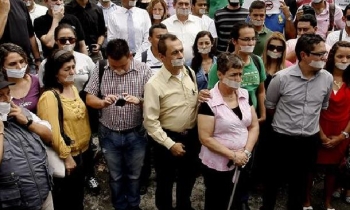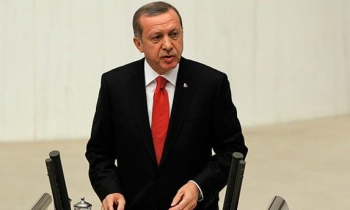Paris-based press freedom group Reporters sans Frontières (RSF) has expressed concern over Mzwandile Ndlovu, a journalist held by the police in the western town of Hwange since his arrest on May 10, and about the constant harassment of employees of two independent newspapers, The Daily News and NewsDay, by police, intelligence officials and members of President Robert Mugabe’s Zanu-PF party.
“We condemn Zanu-PF’s continuing use of such outdated methods as intimidation, physical attacks and arrests to silence its media critics,” RSF said. “Ndlovu was just covering a matter of public interest, without voicing any opinion. His arrest is unacceptable and we call for his immediate release. The independent newspapers that recently obtained licences must also be able to work in complete freedom and their reporters must not be harassed.”
This spate of incidents involving the media comes amid more tension between Zanu-PF and its partner in the ruling coalition, Morgan Tsvangirai’s MDC, and yesterday’s suspension of the constitutional process that must precede a badly needed overhaul of the media law and the organization of future elections.
A reporter for Weekly Agenda (a news bulletin published by the civil society organization Bulawayo Agenda), Ndlovu was arrested after being summoned to police headquarters in Hwange and was charged under section 31 of the Criminal Law Code and Reform Act with reporting a fictitious story.
The charge was prompted by an April 23 article about the Organ on National Healing, Reconciliation and Integration. It said a meeting between the Organ and a coalition of organizations that was supposed to take place at the nearby Victoria Falls was cancelled because the main participants, Vice-President John Nkomo and the commission’s co-president Sekai Holland, failed to turn up.
Without linking the two events, it also reported that MDC member Moses Mzila Ndlovu, a minister in the national reconciliation government, was arrested the same day in Lupane. The police have refused to comment on the journalist’s arrest.
Newspaper vendor Alice Murwisi was attacked by young Zanu-PF members on April 28 while selling copies of The Daily News, an independent newspaper that returned to the newsstands on March 18 after a seven-year ban.
Two days before the attack, one of the newspaper’s senior employees, Trymore Zingwe, received an anonymous threatening phone call. At the same time, former information minister Jonathan Moyo, who together with President Mugabe was responsible for the repressive 2002 media law known as the Access to Information and Protection of Privacy Act (AIPPA), is suing the paper for 60,000 dollars for reprinting old articles about his expulsion from Zanu-PF in 2005.
NewsDay was raided on the night of April 25 by members of the Central Intelligence Organization, who confiscated hard disks and 11 computers. Editor Brian Mangwende not only had his computer taken, his office was also ransacked and damaged. “This is a calculated act of criminality designed to paralyze the operations of the country’s fastest-growing newspaper,” he said. A few days before the raid, NewsDay ran an article headlined “It’s time to rest” that called on Mugabe to stand down.
NewsDay vendors were also threatened by Zanu-PF members in a Harare suburb on March 12 and copies of the newspaper were damaged on March 2.
Police commissioner-general Augustine Chihuri’s recent warnings to news media that publish articles “inciting violence and anarchy” are not reassuring. President Mugabe is on the list of Predators of Press Freedom that RSF released on May 3, World Press Freedom Day.









